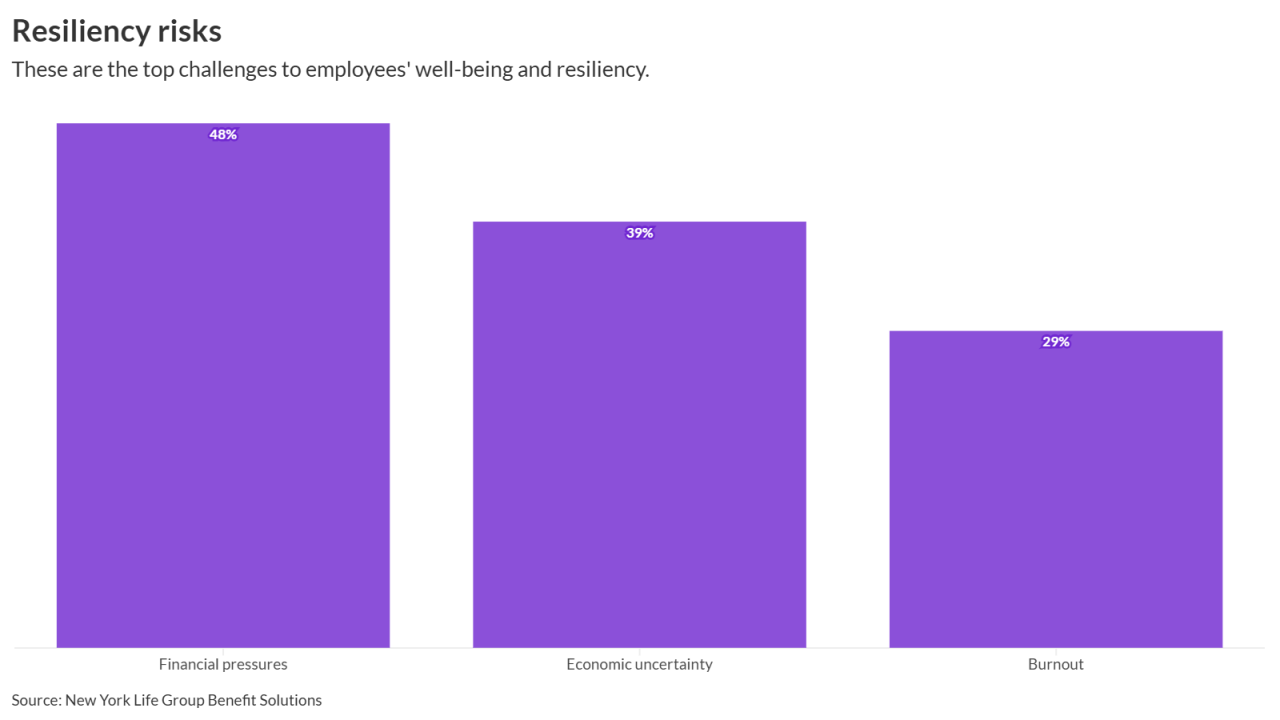Family benefits platform Cleo supports employees caring for loved ones in all capacities, so when its own CEO, Sarahjane Sacchetti, stepped down this year after caring for a terminally ill parent, it made public just how life-altering
To find Sacchetti's replacement, Cleo's board did something unusual: They tapped chief clinical officer Madhavi Vemireddy, M.D., and chief operations officer and senior vice president of legal and compliance Tsion Lencho, to share the position.
The concept of having co-CEOs is not new, but it is rare. Only seven companies in the Fortune 500 currently use this model, according to Harvard Business Review. Yet at Cleo, whose clients include Pinterest, Salesforce and Pepsico among others, the concept of a team approach is foundational to how they function internally, and support their own customers.
"At Cleo, we pass the baton and we model that for our teams as often as possible," Lencho says. "We like to play to our strengths, and I think that's something that we bring forward throughout the organization."
Read more:
Though both Lencho and Vemireddy have executive leadership experience, their individual expertise and responsibilities as
Madhavi, previously a co-founder of caregiving platform CareTribe, oversees clinical and product strategy, product development, program outcomes, member operations, business intelligence and marketing teams.
Both women also bring their perspective as BIPOC female caregivers to their new roles. Lencho and Vemireddy recently spoke with EBN for their first conversation as co-CEOs, and shared how their backgrounds inform their leadership style, as well as their plans for the company's future.
Tell me about Cleo's mission and how you're engaging with members on the platform.
Vemireddy: We know that parents and caregivers represent about 70% of the workforce today. We provide inclusive support based on the needs of a family unit and help them become more empowered to take care of their loved one. We have over 100 guides and specialists across the globe, and they provide that dedicated one-to-one support.
Read more:
As co-CEOs, what do you bring individually to the role, and how has your previous experience with the company helped to prepare you?
Lencho: A motivating quote that describes what I do as a leader is from Muhammad Ali, who said, "It's not the mountain ahead that defeats you; it's the pebble in your shoe." You have to spend a lot of time thinking about what pebbles are now and in the future, and which ones we need to help remove for folks as leaders, or that we need to teach them how to remove themselves.
Having joined [Cleo] when it was fully remote, I observed a lot of the challenges that our own workforce was looking to solve. I think part of the role I play is part archival, part historian and part innovative. Stepping into this role has been exciting because suddenly I get to jump in and have an opinion about what the business operation could and could not do, by looking at our history of trying to implement new products and services and seeing where folks got stuck.
Vemireddy: A majority of my years in population health were focused on how we can drive better whole-person health. When my son was born prematurely in 2010, we were in and out of the PICU for the first nine months of his life. When he was in kindergarten, we were told he was on the autism spectrum, and we struggled — we struggled a lot — and that became the driver of building a company that can support family members who are going through similar journeys. On the other side of the life spectrum, my father-in-law was diagnosed with terminal brain cancer, and we had to figure out hospice and we had to figure out a home care provider. It essentially falls on the caregiver to coordinate and find the right resources.
When I was introduced to what Cleo was doing, we realized instantly the synergies of bringing together family forming and parenting with caregiving support in one platform, which makes it so much easier for families. Coming into this role, my personal and professional life has been about caregiving. Having a clinician at the table really allows you to identify not just the right direction clinically — what can drive value and improvement in health for families — but also cost savings for the employer or health plan, because as we educate families and get them the right resources, we mitigate certain risks. It's that whole umbrella, and all of that needs to work together to drive the outcomes you're looking for.
What example does this partnership set for your workforce, and also for other organizations?
Lencho: When you're trained in corporate law, you think there's only one person who can make all the decisions. But when you see extreme situations such as a pandemic lockdown, or a bank failure, you realize you can't count on a single person to always have all the responsibility because it lacks humanity to apply that standard of expectation on anybody. Particularly in a startup environment, you see entrepreneurs feeling as if they're the ones that have to carry everything forward.
Yes, I'm the specialist for all corporate functions plus commercial strategy, but that does not mean that Madhavi never talks to a customer, doesn't pitch events and won't be at any conferences representing the company. We like to play to our strengths, and what we're really modeling for others is how you can create sustainable professional workforces, and also reminding our workforce that it doesn't all fall on a single person — you need to be able to lean on each other.
Vemireddy: I totally agree. In a plane, you don't have a single pilot, you have co-pilots for a reason. I think teamwork is essential. I love my partnership with Tsion; we talk about the pros and cons from our different angles and then come to what we think is the best decision. Also, we're women, we have families, whether immediate or extended, and we want to have that balance. I think it is a model that allows us to feel like we can spend time with our families and on ourselves, and still achieve professional goals.
Read more:
What advice do you have for people who may doubt that a co-CEO structure is the right fit?
Lencho: When it comes to women of color, and specifically Black women, there are enough statistics out there that demonstrate that not just women-run businesses, but minority run businesses perform better. We've learned how to do more with less in part because there's a bias in fundraising, but also because we're self starters who have to figure it out. We don't necessarily have the benefit of some of our peers. I think many Black entrepreneurs think that they have to start something themselves, and I hope that they can look to our co-CEO partnership as evidence that there are investors out there who are paying attention, and that there may be opportunities for you that can be made available without you having to leave and start something else. I am fortunate and grateful that our board has gotten to know me over the last few years and recognizes and acknowledges that I'm as capable as an MBA or somebody who might fit the typical background of a venture-backed startup leader, and that they have entrusted this stage of Cleo to Madhavi and me.
Vemireddy: Typically what you hear, whether it's venture-backed firms or even internally when you're looking for a CEO, is that the CEO is the ideator, the innovator, and there's always trade- offs. You have a real opportunity here to say, 'Don't expect one person to have that expertise to do it all.'





